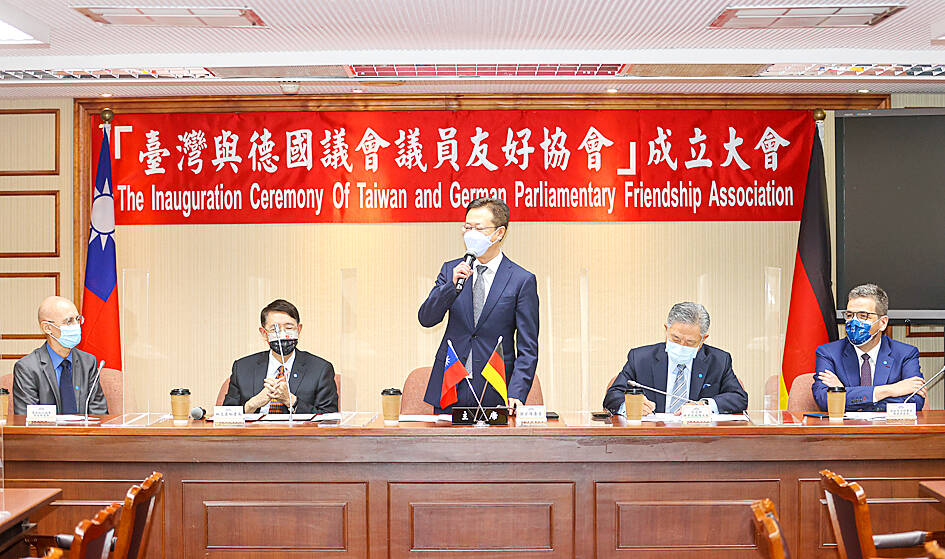Pan-green camp legislators yesterday inaugurated the Taiwan-German Parliamentary Friendship Association at the Legislative Yuan in Taipei, as officials from the two countries seek to boost their ties through bilateral trade, cooperation and exchanges.
German Institute Taipei Director-General Jorg Polster and Ministry of Foreign Affairs officials also participated in the event.
Democratic Progressive Party (DPP) Legislator Chang Hung-lu (張宏陸) is to serve as chairman of the association, comprising 41 lawmakers across party lines. Independent Legislator Freddy Lim (林昶佐), New Power Party Legislator Chiu Hsien-chih (邱顯智), and DPP legislators Fan Yun (范雲) and Lin Yi-chin (林宜瑾) are to serve as Chang’s deputies.

Photo: CNA
German Trade Office Taipei Executive Director Axel Limberg lauded the timing of the launch, as it came ahead of a German parliament delegation visit to Taiwan next month.
Limberg said trade and cooperation between the two countries have developed positively in the past few years, warranting the foundation of a parliamentary friendship association.
German officials have in the past few months spoken up for Taiwan at the WHO, the International Civil Aviation Organization and other UN organizations, he said.
The ties between the two countries are expected to grow closer over the coming years, Limberg added.
Polster said the two countries have a long history of cooperation and exchanges, and last year had a bilateral trade volume of US$20 billion.
Germany is Taiwan’s largest trading partner in Europe, and Taiwan is Germany’s fifth-largest trading partner in Asia, he said.
Chang said he has had a positive impression of German culture ever since helping organize a German Oktoberfest in New Taipei City.
Deputy Minister of Foreign Affairs Tien Chung-kwang (田中光) said Taiwan is a major trade partner of Germany, and the two sides have since 2016 signed more than 10 bilateral agreements.

Nipah virus infection is to be officially listed as a category 5 notifiable infectious disease in Taiwan in March, while clinical treatment guidelines are being formulated, the Centers for Disease Control (CDC) said yesterday. With Nipah infections being reported in other countries and considering its relatively high fatality rate, the centers on Jan. 16 announced that it would be listed as a notifiable infectious disease to bolster the nation’s systematic early warning system and increase public awareness, the CDC said. Bangladesh reported four fatal cases last year in separate districts, with three linked to raw date palm sap consumption, CDC Epidemic Intelligence

Two Taiwanese prosecutors were questioned by Chinese security personnel at their hotel during a trip to China’s Henan Province this month, the Mainland Affairs Council (MAC) said yesterday. The officers had personal information on the prosecutors, including “when they were assigned to their posts, their work locations and job titles,” MAC Deputy Minister and spokesman Liang Wen-chieh (梁文傑) said. On top of asking about their agencies and positions, the officers also questioned the prosecutors about the Cross-Strait Joint Crime-Fighting and Judicial Mutual Assistance Agreement, a pact that serves as the framework for Taiwan-China cooperation on combating crime and providing judicial assistance, Liang

Reports of Taiwanese going missing, being detained or interrogated, or having their personal liberties restricted in China increased about fourfold annually last year, the Mainland Affairs Council (MAC) said yesterday. Last year, 221 Taiwanese who traveled to China were reported missing, were detained and interrogated, or otherwise had their personal freedom restricted, up from 55 the previous year, the council said. Reopening group tours to China would be risky, as it would leave travelers with no way to seek help through official channels after Beijing shut down dialogue between the associations tasked with handling cross-strait tourism, the MAC said. Taipei’s Taiwan Strait Tourism

SHIFT: Taiwan is evolving from a transit stop into a tourist destination, with more international travelers willing to spend on tours, dining and cultural activities Taiwan rose three places in the World Tourism Barometer to 36th globally in 2024, with international tourism revenue of US$10.028 billion, the Tourism Administration said on Monday. The UN Tourism Organization publication said that its focus has switched from whether a country has returned to pre-COVID-19 levels of tourism to the amount spent by a tourist during an overseas trip. The nation last year welcomed 8.57 million international tourists, about 9 percent more than in 2024, with most tourists coming from Japan, South Korea, and Hong Kong and Macau, all of which accounted for at least 1 million tourists each. During the first